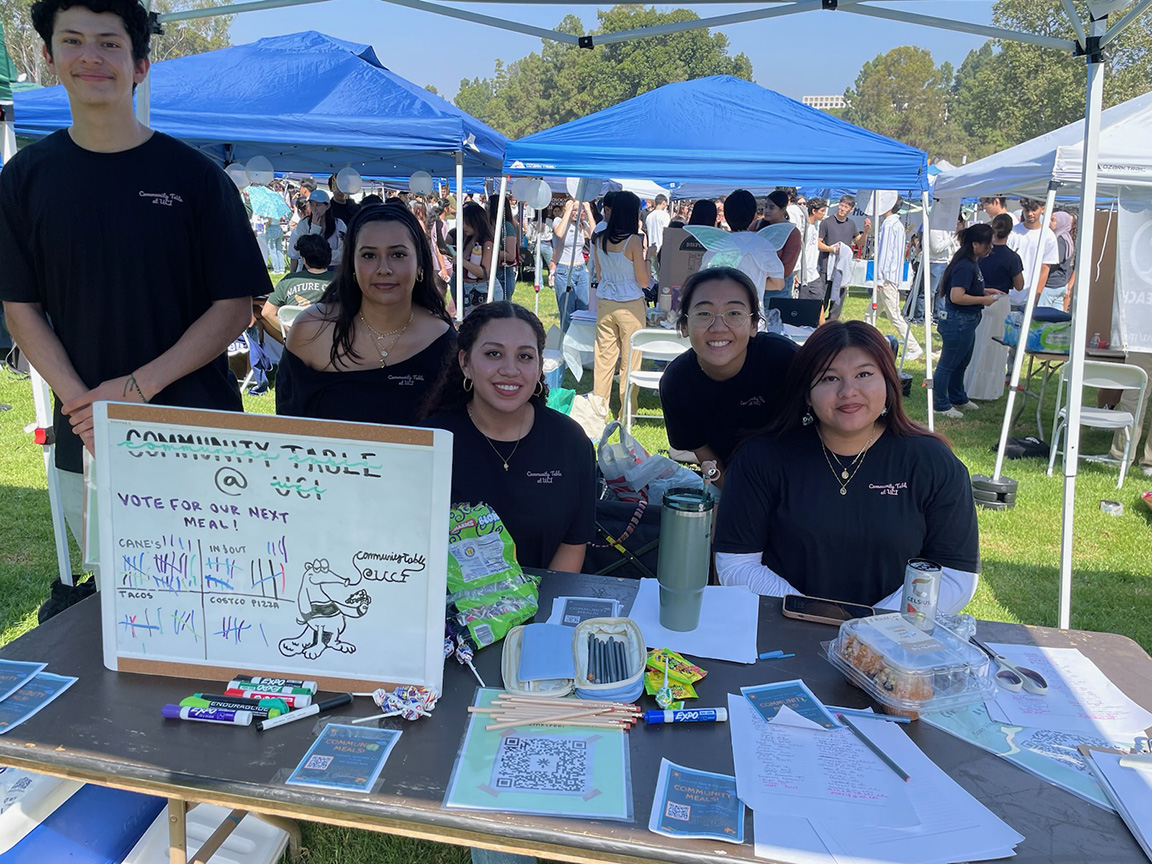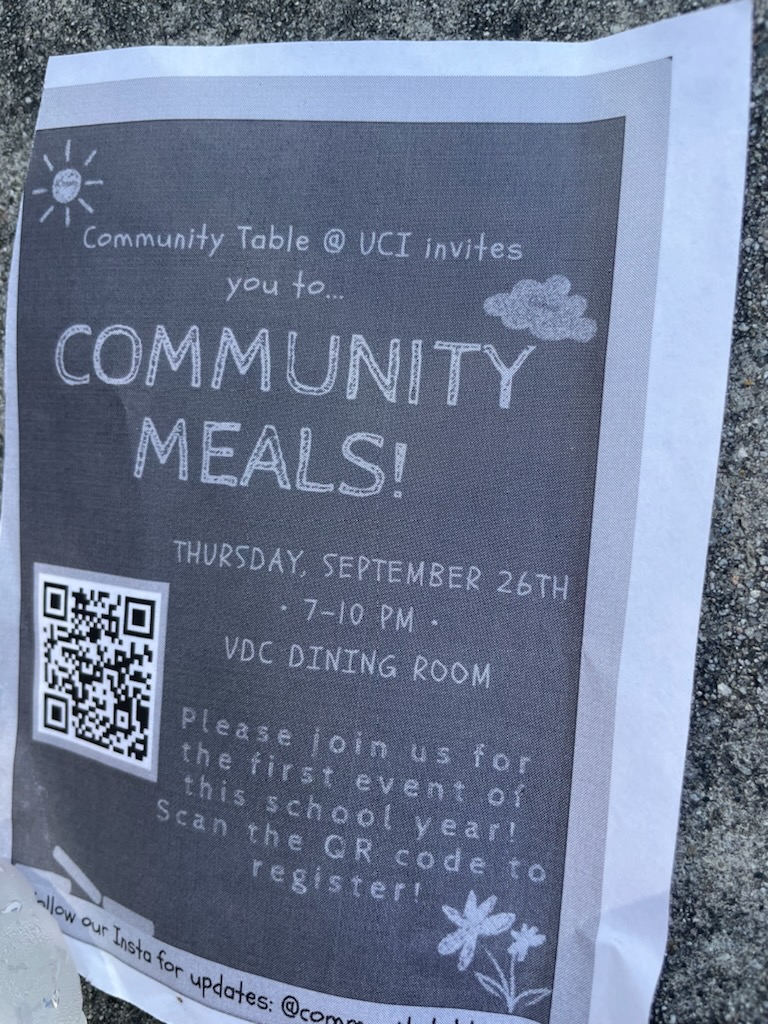
‘Community Table’ seniors recruit new members during U.C. Irvine’s Welcome Week Involvement Fair. The campus ministry was founded by three Orange County Episcopal churches and is now an ecumenical effort providing food and fellowship for students.
[The Episcopal News] Community Table at UC Irvine offers food, fellowship, fun, along with opportunities to develop lasting bonds, learn important skills, and figure out the future. For fourth-year student leader Kimberley Aguilar, it has become a family affair.
“My older brother started with it when Community Table began,” she told The Episcopal News recently. “Then my older sister continued it; she graduated two years ago. I joined as a freshman in 2021.”
Now, as Aguilar and other student leaders – Miguel Zazueta, Caitlin Yoo, Jocelyn Peña and Elizabeth Reid – are approaching graduation, they are actively recruiting new students for Community Table. Recently they staffed a booth as part of the school’s Welcome Week Involvement Fair festivities. For the first time, Community Table also will participate in a booth at the 129th annual meeting of the Diocese of Los Angeles Nov. 8 – 9 at the Riverside Convention Center.
The effort, a collaboration of three Orange County Episcopal churches – St. Andrew’s, Irvine; St. Michael and All Angels, Corona del Mar; St. George’s, Laguna Hills – and the University United Methodist Church in Irvine, began about seven years ago when the Rev. Glenn Libby was seeking ways to revitalize the ministry and to reach students.
“The traditional Canterbury model of Eucharist and Bible study was unsustainable financially and drawing literally one student,” Libby told The News in a recent email. At that time Libby was rector of St. Philip’s Church, Los Angeles, and “one of my communicants, Jesus, from St Philip’s Spanish service, was at UC Irvine.”
“We looked at various options for serving UCI students, such as a mentoring program (turned out there were enough of those already), sponsoring a lecture series (we had a great one on student loneliness, but overall, not going to work very well) and tried a meals project to support food insecure students and provide safe space for conversation and a stress break,” said Libby, who has served as USC chaplain and overseen campus missions work for The Episcopal Church at local, regional, national and global levels.
“This had more promise, so we formed Community Table and seven years later it is still going strong,” he said. “We are doing much more ministry with an important segment of students at far less cost in a sustainable new model.”
Over time, the ministry has grown from just a handful of students making peanut butter and jelly sandwiches to about 40 who attend dinners, play Bingo and make friends. Many are from lower-income families, he said.
“All the campus ministries in the diocese have ended up doing very similar outreach to students who are in various ways marginalized and under-resourced because that is where the need is,” Libby added.
Considering the stress and pressure students face, “Canterbury Irvine decided to be Jesus on the campus by providing food and easing pain and showing the way of love with no strings attached,” he added.
“The church likes to talk about the importance of young adults, but talk is cheap,” he added. “In this diocese we have awesome campus ministries doing important outreach at very low cost. We do almost nothing else for young adults. The very modest campus missions Mission Share Fund budget proposal offers an opportunity to put a very reasonable amount of money where our mouth is.”

Community Table at UC Irvine provides food and fellowship for students.
Joyce Swaving, St. George’s Community Table liaison, said the ministry’s stress breaks foster “a sense of community, family, and meaningful dialogue that is key to what brings them joy and sustains them in times of challenge and also financial struggle. And they don’t need to focus on their challenges.”
Methodist Pastor Cathie Capp joined the effort in 2019, when Libby and others approached her to rent space for the ministry. “My church was the closest to the campus,” Capp said. She offered the space, rent-free, and has partnered with the ministry since. Then, “students cooked for each other and invited their friends.” During the Covid pandemic, the ministry moved online and now has reconstituted in person in a place determined by the students – the campus.
Capp said she has witnessed student leaders blossom into their roles, developing organizational and community-building skills and creating hospitality, especially for newer students. Each student leader has specific responsibilities on a student-led board and receives a $400 per quarter stipend.
Free food and fun initially drew Peña to Community Table, but relationships quickly deepened. “The minute I heard ‘free food,’ I was like, sign me up,” she told The News. But after attending a few meetings, she realized “this is the first time I felt like I was part of the community.”
Her relationships have deepened with other students but also with Capp and Swaving, she added. “Outside of Community Table, I can trust them. I can go to them for anything. My biggest hope is that Community Table will continue to grow and impact new students. It’s been such a big part of my college years.”
Peña says that her role handling social media for the group has helped her prepare for her goal, a career in marketing. Aguilar created a Community Table ‘anteater’ mascot, wearing a chef’s hat, apron and holding a spatula and students are marketing stickers, T-shirts and sweatshirts with the image.
Elizabeth Reid, 21, board vice president, and fourth-year education science student, also said the food and companionship initially drew her into the ministry but its value as a place of support and bonding has been amazing. “It’s a place to meet people, to take a break from schoolwork, to have fun.” Students play Bingo and other games; gift cards to local restaurants are the prizes.
Capp said the ministry’s goal is “for the students to have a positive experience around church leaders who are not asking or demanding things of them, but just highlighting their gifts and inviting them to share and giving them a platform on which they can express their leadership and build friendships.”
“Even though we are not explicitly evangelistic in our content,” opportunities arise to discuss church and faith and “to reframe what the noise is,” she said. Like at a recent on-campus meeting, over pizza, when Yoo, 21, a sociology major, shared about a friend who was followed throughout the campus, even to classes and a restaurant, by a religious group trying to recruit her as a member.
“There’s a way to talk about God,” said Miguel Zazueta. “But not like that.”
“That is not what church should be doing,” Capp said. “Christians should not be doing anything that is not loving or enabling flourishing.” Church is reimagined, she added. “It is not about sitting in the pew. But it’s bringing God’s joy and love into the community and although we don’t have formal conversations, spirituality is still expressed and there’s often discussions about God and purpose and hope – which to me is church. Every conversation become
